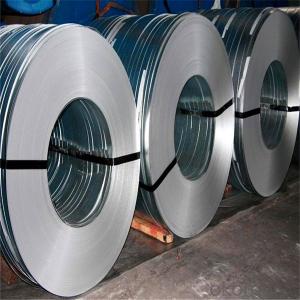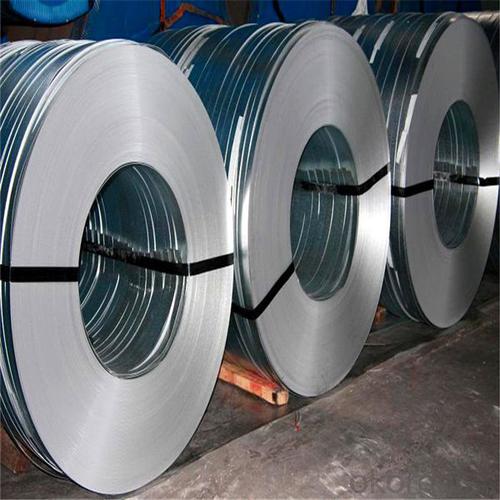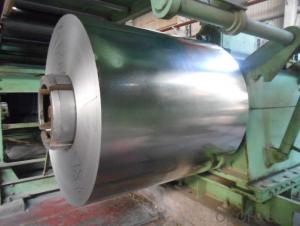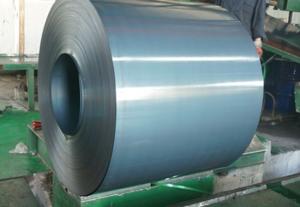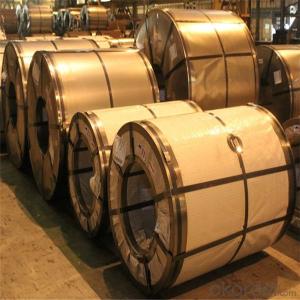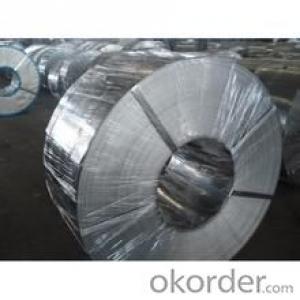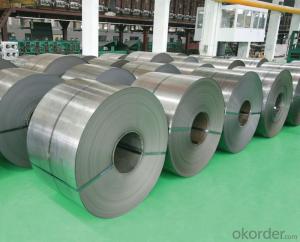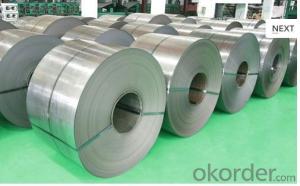Prime Cold Rolled Steel Coils with Low Price Made in China
- Loading Port:
- China main port
- Payment Terms:
- TT OR LC
- Min Order Qty:
- 12 m.t.
- Supply Capability:
- 50000 m.t./month
OKorder Service Pledge
Quality Product, Order Online Tracking, Timely Delivery
OKorder Financial Service
Credit Rating, Credit Services, Credit Purchasing
You Might Also Like
Specification
Standard:
ASTM,GB,JIS
Technique:
Cold Rolled
Shape:
Round
Surface Treatment:
Oiled,Bright
Steel Grade:
Q195,Q215,Q235
Certification:
ISO,SGS,BV,CE
Thickness:
0.18mm-1.8mm
Width:
700mm-1300mm
Length:
according to weight
Outer Diameter:
according to weight
Net Weight:
10MT
Packaging:
Standard Export Packing
Product Description
JIS AISI DIN Standard Colded Rolled Steel CoilSpecification
Grade: Q195,SPCC,SPCD,SAE1006,SAE1008,DC01,DC02,DC03,DC04 etc
Thickness: 0.30-2.00mm
Wide: 1000mm 1210mm 1219mm 1250mm 1500mm
Length:below 12000mm or coil
Surface:Clean, blasting and painting according to customer requirment
Main Products:
| Carbon Steel Cold Rolled steel Plate/steel coil |
| Carbon Steel Hot Rolled steel Plate/steel coil |
| Stainless Steel Cold Rolled Steel Plate / Steel Coil |
| Stainless Steel Hot Rolled Steel Plate / Steel Coil |
| Prepainted Steel Plate/Coil |
| Alloy Steel Plate/Coil |
| Steel Plate for ship building |
| Galvanized Steel Plate / Steel Coil |
| Steel Round Bar, Angle Bar, Channel Steel, H-Beam Steel |
| I-Beam Steel, Square Steel Bar ,Flat Steel Bar Hexagonal Steel |
| Steel Wire Rod, Steel Wire, Steel Strand, Deformed Steel Bar |
| Tubing and Casing Pipe, Line Pipe, Pressure Purpose Pipe, |
| Tube for Structure, Tube for conveyance of fluid, Precision Tube |
| High-pressure pipe fitting, Middle and low pressure pipe fitting, |
| Forged pipe fitting, Socketed , Threaded pipe fitting, Anti-corrosion, |
| Wear-resistance pipe fitting |
Packaging Details:
Packing: Standard export packing, 4 eye bands and 4 circumferential bands in steel, galvanized metal fluted rings on inner and outer edges, galvanized metal and waterproof paper wall protection disk, galvanized metal and waterproof paper around circumference and bore protection
Scope of Application:
Usage: Construction, the manufacturing of cars, ships, containers and household electric appliances, other industries usage.
Product Image:
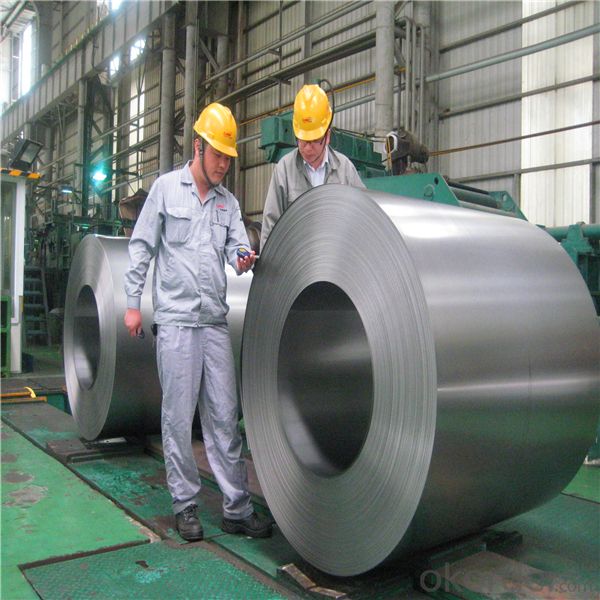
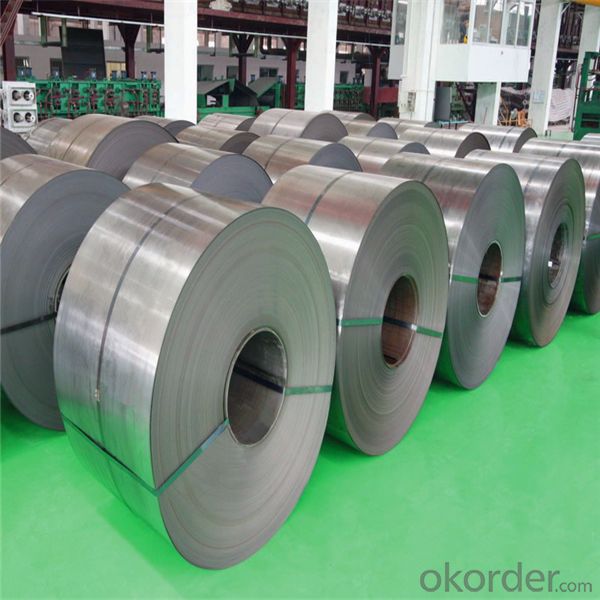
- Q: What are the different types of steel coil packaging materials used during processing?
- There are several types of steel coil packaging materials commonly used during processing, including but not limited to, steel strapping, plastic strapping, stretch film, shrink film, steel coil covers, and wooden crates.
- Q: i cant find this stuff about steel:conductivitystrengthcorrosion resistancecommon applicationsif you know of any interesting facts, i could use those 2!thanx!
- The strength and corrosion resistance depends on the mix. Pure steel is pure iron plus 6% pure carbon. It is the carbon molecules that give it a tough crystallized strength. Pure iron is wrought iron and you can bend that with your hands. Strength also depends on the shape of the beam the most common steel beam is the W flange more commonly called the I beam. That is because the strength of the ‘I’ beam is just a little bit less than if the entire I beam was filled in; however the weight and material savings is huge. Steel itself has no corrosion resistance and is often given a zinc coating just to resist oxidization. Manganese, vanadium and tungsten are just some of the other elements added to improve the steel.
- Q: How are steel coils used in the production of furniture?
- Steel coils are used in the production of furniture to provide structural support and durability. They are commonly used in the construction of sofas, chairs, and other seating furniture to create a strong and sturdy foundation. The coils are typically incorporated into the furniture's frame or used in the construction of the seat cushions, providing comfort and resilience.
- Q: What are the factors affecting the corrosion resistance of steel coils?
- There are several factors that can affect the corrosion resistance of steel coils. These factors include the composition of the steel, the presence of impurities or alloying elements, the surface finish or coating on the coils, the environmental conditions such as humidity and temperature, and the presence of corrosive chemicals or substances in the surrounding atmosphere. Additionally, factors such as handling and storage practices can also impact the corrosion resistance of steel coils.
- Q: Please people suggest me how can I select external finishing for Steel Building as there is a wide range of choice available.
- Nowadays, okorder /
- Q: How are steel coils used in the production of metal cladding?
- Steel coils serve as the primary raw material for metal cladding production. Metal cladding involves covering a building's exterior with a layer of steel to enhance its durability, aesthetics, and insulation. To begin the manufacturing process, galvanized steel coils are used. These coils are made by coating steel with zinc to prevent corrosion. They are then unrolled and fed into a roll-forming machine, which shapes them into the desired profile for the cladding panels. Once the coils are formed, they undergo various processes to improve their properties. These processes include cutting, perforating, and embossing to create patterns, textures, or openings in the panels. Additional protective layers, such as paint or powder coating, can also be applied to enhance corrosion resistance and appearance. The shaped and processed coils are assembled into metal cladding panels. These panels interlock seamlessly to create an appealing exterior for buildings. They can be attached to the building's structure using screws, clips, or adhesives. Using steel coils in metal cladding production offers several advantages. Steel is a strong and durable material, making it suitable for exterior applications that require resistance to weathering, impact, and other environmental factors. It also allows for a wide range of design options and customization. In summary, steel coils are essential in the production of metal cladding. They serve as the raw material, which is shaped, processed, and assembled into panels that enhance buildings' protection, aesthetics, and insulation properties.
- Q: How are steel coils used in the production of agricultural machinery parts?
- Due to their strength and versatility, steel coils find common usage in the manufacturing of agricultural machinery parts. Materials chosen for agricultural machinery parts, like blades, plowshares, and cultivator tines, must possess durability and the ability to withstand harsh conditions. Steel coils effectively meet these requirements, providing the necessary strength and durability for such parts. The process commences with the unwinding and cutting of the steel coils into desired lengths. These lengths are then fed into a machine where they undergo a series of shaping processes, including bending, cutting, and stamping. These shaping processes enable the steel to be molded into the precise shapes demanded by agricultural machinery parts. Upon achieving the desired shape, it is often customary to subject the steel parts to heat treatment in order to enhance their strength and durability. Heat treatment involves subjecting the parts to high temperatures, followed by rapid cooling. This treatment significantly elevates the steel's hardness and toughness, rendering it more resistant to wear and tear experienced in the agricultural field. Following the heat treatment, the steel parts may undergo additional processes, such as welding, surface coating, or painting, depending on the specific requirements of the machinery. These additional processes further enhance the durability and longevity of the parts. In conclusion, the significance of steel coils in the production of agricultural machinery parts cannot be overstated, as they ensure the provision of requisite strength, durability, and versatility. The utilization of steel coils guarantees that these parts can effectively endure the demanding conditions encountered in agricultural operations, ultimately contributing to the efficiency and productivity of the farming industry.
- Q: I work at a tool store. I told my boss last week we needed more pruning shears so he did get more of all kinds. Thing is out of all of the shears he brought Two of different kinds say they are made out of Japanese steel. I have never heard of Japanese steel so now i ask you (the public) whats the difference between it and steel from the US or any other country? Those shears are worth more then the ones he gets from Mexico and China and even more than Black and Decker, Fiskars, etc but not more then Corona brand ones.
- I doubt japanese steel has any special quality in its own, but they might just be higher quality shears. For example, Chinese qualities are good depending on what they are, but are usually not professional made with the greatest equipment. Same for Mexico. The company that makes them might just put more effort into making sturdier and sharper shears and thus make them more expensive, but Corona might make them a bit better so they are priced less than Corona's.
- Q: What are the environmental impacts of steel coil production?
- The environmental impacts of steel coil production include the extraction of raw materials, such as iron ore and coal, which can lead to deforestation, habitat destruction, and soil erosion. The steel manufacturing process also releases significant amounts of greenhouse gases, such as carbon dioxide, contributing to climate change. Additionally, the production of steel coils requires large amounts of water and energy, leading to water scarcity and increased carbon emissions.
- Q: I mean about if I had a piece of metal, how can i decide that's iron or steel?Sorry for bad English.
- Iron and steel have different thermal expansions and specific heats. You could either heat it up and see how much it changes in length or you could put it in water inside a calorimeter and observe how much the temperature of the water changes
Send your message to us
Prime Cold Rolled Steel Coils with Low Price Made in China
- Loading Port:
- China main port
- Payment Terms:
- TT OR LC
- Min Order Qty:
- 12 m.t.
- Supply Capability:
- 50000 m.t./month
OKorder Service Pledge
Quality Product, Order Online Tracking, Timely Delivery
OKorder Financial Service
Credit Rating, Credit Services, Credit Purchasing
Similar products
Hot products
Hot Searches
Related keywords
